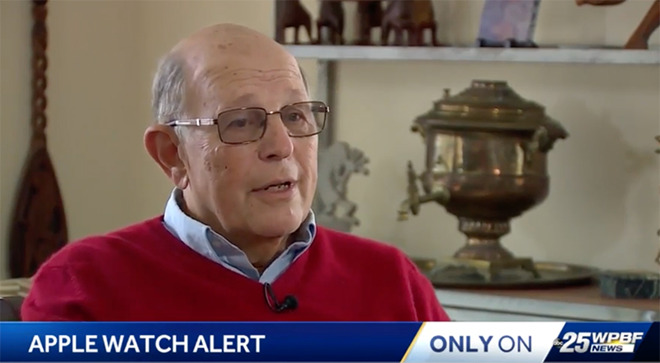Apple Watch alerts Florida man of A-fib, a condition he didn't know existed
A 74-year-old man from Lake Worth in Palm Beach County, Fla., credits Apple Watch with saving his life after the device alerted him to an atrial fibrillation event during a trip to Baltimore.

Roy Robinson was alerted to an A-fib event by his Apple Watch. | Source: WPBF
Roy Robinson told ABC News affiliate WPBF that he was on a trip to visit family when a notification reading, "You're in A-fib," popped up on his Apple Watch. Alerts continued to sound about once an hour.
Atrial fibrillation is an irregular heart rate often characterized by rapid beats that can lead to heart failure or stroke.
The first warning was triggered when Robinson found himself out of breath after walking up three flights of stairs at his granddaughter's school, an unusual occurrence as he considers himself fairly fit. Notifications persisted throughout the day, but it was only when Apple Watch sounded an A-fib alarm while he was laying on the couch that he and his family decided to investigate.
"I had no idea what A-fib was," he said.
Following the sixth alert, Robinson conducted a Google search for "A-fib" and, after finishing Thanksgiving dinner, headed to Johns Hopkins Hospital.
"We showed up at the hospital and they said, 'Why are you here?' I says, [. . .] 'My watch says that I'm in A-fib,'" Robinson said. "So he hooks me up to the electrocardiogram and after about 30 seconds of looking at the electrocardiogram, says, 'We're admitting you.'"
A number of doctors, interns, residents and nurses visited Robinson during his time at the facility, saying they wanted to see the "guy that was saved by the Apple Watch."
"I'm not sure if it saved my life, but it sure as hell helped," he said.
Apple Watch has been credited with saving multiple lives since automatic A-fib detection was added to the device's feature set in 2018. The system works by regularly monitoring a user's heart rate data, which is collected by a specialized sensor embedded in the wearable's backside.
Apple continues to build out Apple Watch's suite of health tools, with current iterations of the device boasting a single-lead ECG to better detect irregular heart rhythms.

Roy Robinson was alerted to an A-fib event by his Apple Watch. | Source: WPBF
Roy Robinson told ABC News affiliate WPBF that he was on a trip to visit family when a notification reading, "You're in A-fib," popped up on his Apple Watch. Alerts continued to sound about once an hour.
Atrial fibrillation is an irregular heart rate often characterized by rapid beats that can lead to heart failure or stroke.
The first warning was triggered when Robinson found himself out of breath after walking up three flights of stairs at his granddaughter's school, an unusual occurrence as he considers himself fairly fit. Notifications persisted throughout the day, but it was only when Apple Watch sounded an A-fib alarm while he was laying on the couch that he and his family decided to investigate.
"I had no idea what A-fib was," he said.
Following the sixth alert, Robinson conducted a Google search for "A-fib" and, after finishing Thanksgiving dinner, headed to Johns Hopkins Hospital.
"We showed up at the hospital and they said, 'Why are you here?' I says, [. . .] 'My watch says that I'm in A-fib,'" Robinson said. "So he hooks me up to the electrocardiogram and after about 30 seconds of looking at the electrocardiogram, says, 'We're admitting you.'"
A number of doctors, interns, residents and nurses visited Robinson during his time at the facility, saying they wanted to see the "guy that was saved by the Apple Watch."
"I'm not sure if it saved my life, but it sure as hell helped," he said.
Apple Watch has been credited with saving multiple lives since automatic A-fib detection was added to the device's feature set in 2018. The system works by regularly monitoring a user's heart rate data, which is collected by a specialized sensor embedded in the wearable's backside.
Apple continues to build out Apple Watch's suite of health tools, with current iterations of the device boasting a single-lead ECG to better detect irregular heart rhythms.

Comments
Unfortunately, the people (population) that would benefit the most are the people least likely to buy one... (elderly)
Hell, I even bought one for my brother cause I know he is too stingy towards himself to get one (always put his children and wife above his own well-being). Told him it is all the more important that he stays healthy and gets help at earliest possible moment should anything happens so that he doesn’t becomes a burden to them. Thank god he didn’t reject the gift and hopefully that helps.
So which is it?
If you listen to a cardiologist they’ll tell you the Apple Watch has questionable value. Just because a couple instances of the heart monitor gets a person in to see their doctor and there is a problem, that leaves out thousands (?) of unneeded visits and stress that results. The cardiologist explains that the tests themselves can be harmful (it’s not just listening to the heart). It’s a numbers game...
Now if you’re an older person or a person with a known problem, owning an Apple Watch makes a lot more sense (if you bought it for that reason).
The guy's a legend!
My suggestion is that next time the guy's Apple Watch throws an A-fib alert he should discontinue any meds he may be taking for the condition, and proceed to ignore the alerts. That way we'll have a control case to help fill out the experimental data to determine whether he was saved or merely helped. Of course on that basis it may be a bit hard to recruit further subjects for study, but hey, you can't let the perfect be the enemy of the good.
What else ya got?